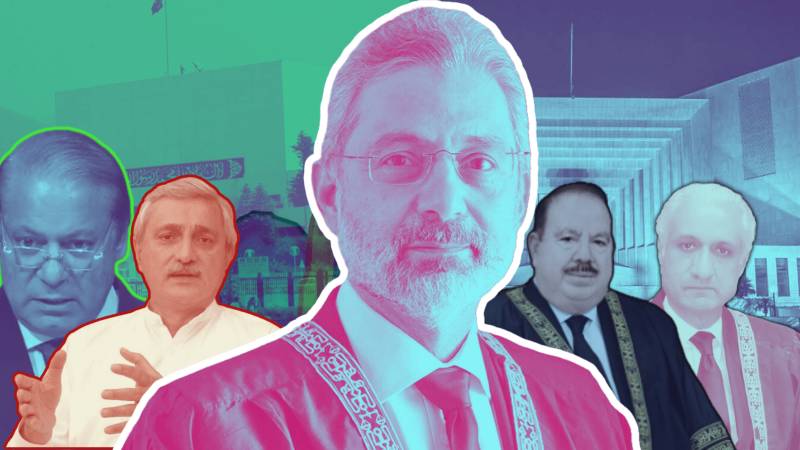
The recent verdict by Pakistan's Supreme Court, upholding the Supreme Court (Practice and Procedure) Act, 2023 and recognising Parliament's authority to regulate the court's procedures, is set to usher in a new era with profound implications.
This historic decision transcends the legal realm, significantly impacting the judiciary's independence, the nation's political fabric, the core principles of parliamentary democracy, checks and balances, and the separation of powers.
Empowering the judiciary: A paradigm shift
This judgment heralds a landmark transformation for Pakistan's judiciary. It fortifies its independence, reinforces accountability, and elevates its credibility. Notably, the influence of the chief justice has been diluted. It is no longer a 'one-person show', a development that has the potential to safeguard the judiciary from both external and internal threats.
For years, concerns have persisted about powerful entities manipulating the chief justice to shape decisions to serve their interests.
In the recent past, serious allegations were levelled against former chief justice Saqib Nisar. However, by redistributing this authority amongst a three-person committee, the prospects of orchestrating a complete takeover of constitutional courts through manipulation of the chief justices now face formidable barriers.
But with the balance of power shifting, it will be more challenging to exert coercive persuasion.
Mitigating absolute power: Lessons from the past
The experiences of the Supreme Court under former chief justices Iftikhar Chaudhry and Saqib Nisar brought to light the perils of individuals wielding unchecked power.
The decision in the Practice and Procedure Act introduces a significant check against the potential for a rogue "chief justice" to disrupt the legal system, safeguarding the judiciary and the nation from undue interference.
The traditional concentration of power in the chief justice, who also serves as the chairperson of the Supreme Judicial Council, raises concerns about the potential for abuse. Through their administrative powers, chief justices have the means to make internal judicial accountability mechanisms redundant, creating a situation that could enable unchecked decision-making.
Protecting judicial independence: A collective effort
This decision offers additional protection for individual judges against internal pressures that might compromise their independence.
Given their administrative authority, chief justices of the high courts can exert influence over fellow judges. This issue has been acknowledged by legal luminaries such as Justice (retired) Asif Saeed Khosa and prompted public complaints from Justice Qazi Faez Isa and Justice Shaukat Siddiqui.
The benefits and reforms stemming from this decision are not confined to the Supreme Court alone; they are equally applicable to the high courts of Pakistan.
Fostering collaborative justice: Navigating ideological differences
The decision also impacts how chief justices define their tenures.
Traditionally, they have left their mark through the cases they chose to hear and the verdicts they gave.
The decision empowers the Parliament to play a more active role in the appointment of judges to superior courts, an area previously dominated by the judiciary
However, Chief Justice Qazi Faez Isa's capacity to shape his judicial agenda and take on radical, anti-establishment cases has been considerably constrained. This results from the presence of judges such as Justice Ijazul Ahsan, who has often been at odds with Chief Justice Isa. And now, to have him as one of the committee members who will decide the roster of judges and suo motu under Article 184(3).
Similarly, the final committee member, Justice Sardar Tariq Masood, is known for his moderate stance. It presents an opportunity for collaborative efforts among judges from various backgrounds.
Political ramifications: Checks and balances
Beyond the judiciary, the ripples from this verdict will extend into the political arena, impacting the system of checks and balances there.
The decision empowers the Parliament to play a more active role in the appointment of judges to superior courts, an area previously dominated by the judiciary.
This also includes a more prominent role for the constitutional Parliamentary Committee on Judicial Appointments.
Elections and constitutional litigation: A complex landscape
In the immediate political landscape, the decision has implications for disqualified parliamentarians, such as three-time prime minister Nawaz Sharif and Istehkam-e-Pakistan Party (IPP) Chairman Jehangir Khan Tareen.
Nawaz Sharif's eligibility to participate in elections stems from a critical parliamentary amendment to the Election Act of 2017.
Crafted by Pakistan's legislative body, this amendment extends a pathway for individuals previously disqualified under Article 62(1)(f) to reenter the political arena. It effectively reduces the disqualification period, allowing Nawaz Sharif to seek public office once again.
However, it's crucial to recognise the legal and constitutional intricacies surrounding this decision. The amendment, though enacted by Parliament, contradicts a significant precedent set by the Supreme Court during the Bandial era.
The Bandial ruling firmly established that disqualification under Article 62(1)(f) is tantamount to a lifelong ban from electoral participation.
This landmark judgment reinforced the principle that individuals found ineligible on these grounds would remain disqualified for the entirety of their lives.
To impede Nawaz Sharif from contesting any upcoming elections, a constitutional court must first undertake the complex and sensitive task of declaring the amended Section 232 in the Election Act of 2017 unconstitutional.
Until such a momentous legal determination transpires, Nawaz Sharif retains his eligibility to participate in the democratic process and potentially influence Pakistan's political landscape once more.
The situation, thus, foreshadows the possibility of another round of intense constitutional litigation, further highlighting the intricate legal and political challenges that this issue entails.
Forging a new path
This historic decision by the Supreme Court marks a turning point in Pakistan's legal and political history. It empowers the judiciary, safeguards against the concentration of power, and encourages a more collaborative and balanced political landscape. The road ahead is undoubtedly challenging but offers a path to a more accountable and democratic Pakistan.
As this new era dawns, the nation witnesses the promise of a brighter, more inclusive, and transparent future for its democracy. It is a testament to the enduring strength of the nation's institutions and their ability to adapt, evolve, and uphold the principles of justice and democracy for the benefit of all citizens.

